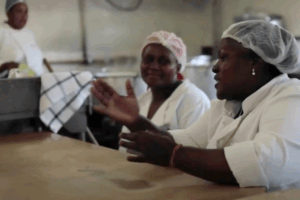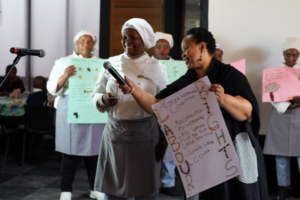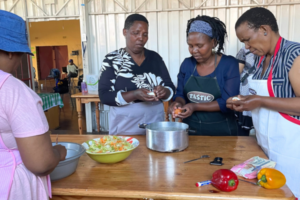Former volunteer food handlers voice their concerns and demands outside a labour office in Gauteng. Photo: Zanele Chakela
Many Volunteer Food Handlers, who have provided daily meals to millions of learners through the National School Nutrition Programme (NSNP), face challenges accessing the Unemployment Insurance Fund (UIF) at the end of their two-year contracts. Despite contributing to the UIF, they struggle with a broken system to obtain their benefits.
The NSNP is part of the social sector of the Expanded Public Works Programme (EPWP), a cluster of care programmes that rely on women’s labour. An evaluation by the Department of Public Works and Infrastructure finds that inconsistencies in applying standards for Expanded Public Works Programme (EPWP) projects have caused misinterpretations, manipulations, and inaction, leading to poor enforcement and compliance.
The two-year contract for the woman working as a Volunteer Food Handler promises recognition for her care work, skill enhancement, and new job opportunities. Treating her as an unskilled, unemployed woman who should be grateful for a small stipend crushes her potential for empowerment and growth.
This is the first in a series on our campaign with a group of former and current Volunteer Food Handlers in Gauteng, for adequate access to UIF benefits. Read the articles here (UIF claiming process), here (role play as a feminist popular education tool in UIF campaign by food handlers), here (dignity, labour and access to UIF), and here (a day in the life of a food handler).
In terms of the Unemployment Insurance Act, the Unemployment Insurance Fund (UIF) is funded through contributions made by both employers and employees, and collected by the Commissioner of the South African Revenue Service in accordance with the Unemployment Insurance Contributions Act.
The Act stipulates, under Part B, Section 15, that unemployment benefits must be calculated from the date of unemployment. Importantly, the claims officer may consider backdating an application if a delay was caused by circumstances beyond the contributor’s control. Furthermore, Section 16 confirms that a contributor is entitled to unemployment benefits if they have been unemployed for more than 14 days due to the termination of their employment by the employer, or the expiration of a fixed-term contract.
This legal framework is particularly relevant to the ongoing challenges faced by volunteer food handlers employed through the National School Nutrition Programme (NSNP). As documented by the LRS, these food handlers played a crucial role in school feeding schemes across the country. However, when their two-year contracts ended at the end of March 2025, many of them were met with serious obstacles in accessing their UIF benefits.
A primary concern raised by the food handlers is that many were never registered for UIF by the schools they were placed in, making it impossible to submit claims. Those who were registered report being sent back and forth between schools and the Department of Labour, often encountering administrative discrepancies. One such issue is the incorrect recording of the number of days worked—an essential detail that directly impacts the amount a claimant is eligible to receive.
This back-and-forth between the Department of Labour and the schools—often requiring them to travel to meet with school principals—poses a serious financial burden. Many of these food handlers are now unemployed and simply cannot afford repeated trips to government offices and schools. The financial strain, coupled with the lack of progress and support, has left many feeling discouraged, demoralised, and on the verge of abandoning the claims process altogether.
“The UIF process is depressing enough, and then I am being ridiculed and treated like a nuisance when I try to get my UIF. The school community is making a joke out of our poverty. We are so desperate now and the people who are supposed to be helping us treat us like outcasts. Each time I visit the school I feel angry and I don’t sleep because the staff humiliate us so much to a point where we feel like invalids.”
— Former Volunteer Food Handler
Adding to their frustration is the inconsistency in how claims are being handled. While some food handlers have managed to receive their benefits without much difficulty, others have faced long, confusing, and discouraging experiences. A major point of contention is the absence of standardised working hours. Many food handlers claim they were not formally assigned specific hours, which has further complicated the claim verification process.
In response to this concern, a meeting was held with representatives from the National Department of Basic Education, specifically those overseeing the NSNP. They clarified that food handlers should be considered as having worked eight-hour days, and that this standard should be reflected in all official documentation. This information was promptly relayed to food handlers whose contracts were nearing their end.
Unfortunately, the process has since stalled at the implementation level. Principals and some Department of Labour officials have reportedly refused to sign off on UIF documentation reflecting eight-hour working days. This refusal directly contradicts the guidance provided by the national department and continues to hinder the food handlers’ ability to access the UIF benefits to which they are lawfully entitled.
The experience of these food handlers underscores the urgent need for greater coordination and accountability between schools, provincial departments, and the Department of Labour. Ensuring that all workers—especially those in vulnerable, low-income positions—are properly registered and fairly treated within the UIF system is not just a legal obligation, but a moral one.
RELATED CONTENT
Access Denied: A woman worker’s struggle for social protection
In this video, we follow Elizabeth, a former Volunteer Food Handler, as she struggles to access her UIF benefits. Her experience is shared by many other women who worked under the National School Nutrition Programme.












